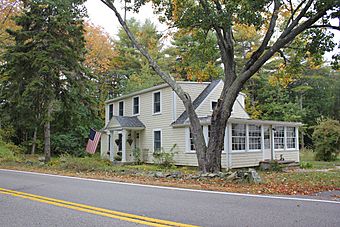Rock Rest facts for kids
Quick facts for kids |
|
|
Rock Rest
|
|
 |
|
| Location | 167 Brave Boat Harbor Rd., Kittery, Maine |
|---|---|
| Area | 1.8 acres (0.73 ha) |
| Built | 1946 |
| Architectural style | Late 19th And Early 20th Century American Movements |
| NRHP reference No. | 07001449 |
| Added to NRHP | January 24, 2008 |
Rock Rest is a special old house in Kittery, Maine. It was once a summer guest house for travelers. Clayton and Hazel Sinclair owned and ran Rock Rest from 1946 to 1977. This place was very important because it welcomed African-American guests. This was during a time when many places did not allow Black people to stay because of unfair rules. Rock Rest was added to the National Register of Historic Places in 2008. This means it is a historically important place.
Contents
What Does Rock Rest Look Like?
Rock Rest is located on Brave Boat Harbor Road in Kittery. The main house is a one-and-a-half-story building. It is built in a style called "Cape." It has a sloped roof with windows sticking out, called dormers. These dormers make the second floor much bigger.
The Main House and Guest Building
There is a large glassed-in porch on one side of the house. A small, covered porch is at the front door. Next to the main house is a driveway. Further back from the road is another building. This building was used as a guest house and a garage.
From the street, the guest house looks like a two-car garage. It has a small half-story above it. But a much larger part of the building stretches out behind it. This back part had a common area on the first floor. Guests could relax and gather there. The second floor of this part had more guest rooms.
The Story of Rock Rest's Owners
Clayton and Hazel Sinclair bought the property in 1938. They both came from New York City. Before they met, they worked for summer visitors. They made the small house bigger. Then, they started letting guests stay there. This was before World War II ended.
How Rock Rest Became Popular
Hazel Sinclair was known as a great cook. People heard about her cooking and the welcoming place. More and more guests came to stay. They officially opened Rock Rest as a summer guest house in 1946. At its busiest, Rock Rest could host 16 guests at one time. In the 1950s, as many as 50 groups of people stayed there each summer.
Most of the guests were African-American. They came mainly from the northeastern United States. Rock Rest became very successful. It was so popular that it did not even need to advertise. The Sinclairs kept the business going. They continued even after Maine passed a law in 1971. This law made it illegal to discriminate in public places. Rock Rest finally closed in 1977. It closed because Clayton and Hazel were not well enough to run it anymore.
 | Selma Burke |
 | Pauline Powell Burns |
 | Frederick J. Brown |
 | Robert Blackburn |



